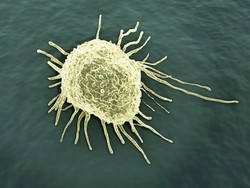Jumping DNA to elucidate metastasis
Colorectal cancer (CRC) is the second leading cause of cancer-related deaths, mainly due to advanced metastatic disease. For cells to become metastatic and invade other tissues, they must overcome the rate limiting step of anchorage dependence. Accumulating evidence indicates that similarly with tumour initiation, there are various metastasis-promoting and suppressing protein-coding genes as well as non-coding RNA (ncRNA) transcripts. Investigating the molecular mechanisms that trigger and drive metastasis could lead to the development of targeted therapies. The scope of the EU-funded TRANSPOSON GET NCRNA (Transposon based forward genetic screen for the identification of ncRNAs involved in colorectal cancer metastasis) project was to identify ncRNAs involved in CRC metastasis. To achieve this, scientists developed a novel mutagenic tool based on transposons, DNA elements that can change their position within the genome. Using this tool, they performed a genetic screen in human CRC cells to select for hits with a pro-metastatic advantage. Via a modified anoikis resistance assay, they selected for cells that survived the absence of anchorage and analysed the mutations in ncRNA genes. Researchers successfully identified a novel molecular mechanism involving a protein-coding gene and a ncRNA that is important for cell survival. Future studies in patient samples and pre-clinical models would help elucidate the role of this particular gene in CRC metastasis. Researchers discovered novel genetic elements with a putative role in CRC. Importantly, the TRANSPOSON GET NCRNA work demonstrated that transposons could be used as a mutagenic tool to target non-coding elements of the genome by simple insertional mutagenesis. These tools could also be used to identify the genetic elements that regulate other processes such as chemoresistance. Taken together, the findings of the TRANSPOSON GET NCRNA study could lead to novel therapeutic targets and eventually improve the outcome of patients with metastatic CRC.







